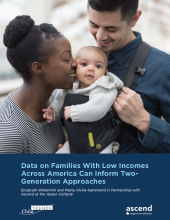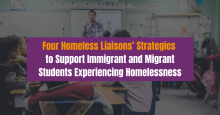0
Podcast
Community:
Mar 29, 2023
Climate change will affect everyone, so what measures can U.S. communities take now to adapt and thrive? From water-saving landscapes to strategic retreats from hazard-prone areas, experts Colleen Moore and Alexis St. Juliana explore a range of promising responses they’ve identified and explain why historically vulnerable communities must be part of the solutions.
Authored by: Colleen Moore and Alexis St. Juliana for Abt Associates
Topics: Community development, Energy, Environmental Resiliency/Climate Change, Green, Housing, Low-income, Research, Sustainability
 Shared by Sandra Ware
Shared by Sandra Ware
Sandra Ware posted a
on Mar 30, 2023
Colleen Moore and Alexis St. Juliana for Abt Associates
Climate change will affect everyone, so what measures can U.S. communities take now to adapt and thrive? From water-saving landscapes to strategic retreats from hazard-prone areas, experts Colleen Moore and Alexis St.
0
Publication
Community:
Mar 2, 2023
Many students and families arrive in the U.S. from other countries without safe, stable housing, and experience homelessness and high mobility that can last for months. At SchoolHouse Connection, we recognize the crucial role that schools can play in providing stability and support to mitigate the disruption and trauma caused by homelessness. This page is dedicated to providing educators, policymakers, and advocates with valuable resources on how to best support these families and youth, and help ensure that all students have the opportunity to succeed in school and beyond.
Authored by: School House Connection
Topics: Early childhood, Education, Grade-level proficiency, Homelessness, Housing, Immigrants, Legislation & Policy, School-readiness, Youth
 Shared by Sandra Ware
Shared by Sandra Ware
Sandra Ware posted a
on Mar 14, 2023
Many students and families arrive in the U.S. from other countries without safe, stable housing, and experience homelessness and high mobility that can last for months.
0
Report
Community:
Mar 1, 2023

We are delighted to share a new research report in partnership with Child Trends: Data on Families with Low Incomes Across America Can Inform Two-Generation Approaches. In this new analysis, research experts Elizabeth Wildsmith and Marta Alvira-Hammond paint a detailed picture of how families in households with low incomes in the United States have changed since 2011. The report highlights 10 key findings from their analyses of family economic and social conditions related to financial security and mobility, family structure and living arrangements, education and employment, parental health, and community health indicators (for example, rates of child poverty, violent crime, child care costs). A deeper understanding of families with low-incomes will inform our collective work and strengthen how our 2Gen policy and practice recommendations can prioritize health, education, employment, and economic assets to ensure families have access to the resources they need to build intergenerational prosperity and well-being.
Authored by: Elizabeth Wildsmith and Marta Alvira-Hammond for Child Trends in partnership with Ascend at the Aspen Institute
Topics: dual-generation initiative, Early childhood, Education, Health, Housing, Legislation & Policy, Low-income, Racial inequalities
 Shared by Sandra Ware
Shared by Sandra Ware
Sandra Ware posted a
on Mar 2, 2023
Elizabeth Wildsmith and Marta Alvira-Hammond for Child Trends in partnership with Ascend at the Aspen Institute
We are delighted to share a new research report in partnership with Child Trends: Data on Families with Low Incomes Across America Can Inform Two-Generation Approaches.
0
Report
Community:
Mar 1, 2023
At this time of year, pull up to a busy intersection or pass by some popular public gathering place in and around Durham, and there’s a good chance you might find a sign advertising “PreK for All.” January kicks off Durham PreK’s annual recruitment campaign for the approaching school year, and if you have a rising preschooler in your life, you may be wondering what it means to offer pre-k for all.
The resulting report, “Toward Equity in Durham PreK: Addressing the Accessibility of Wraparound Care as a Barrier to Universal PreK in Durham,” details the findings, identifies key program participation challenges tied to wraparound care access and availability, and offers conclusions and recommendations for addressing these challenges now and in the future.
Authored by: Child Care Services Association (CCSA)
Topics: COVID-19, Early childhood, Education, Funding, Housing, Legislation & Policy, Low-income, Racial inequalities
 Shared by Sandra Ware
Shared by Sandra Ware
Sandra Ware posted a
on Mar 2, 2023
Child Care Services Association (CCSA)
At this time of year, pull up to a busy intersection or pass by some popular public gathering place in and around Durham, and there’s a good chance you might find a sign advertising “PreK for All.” January kicks off Durham PreK’s annual recruitment campaign for the approaching school year, and if yo
0
Case study
Community:
Feb 9, 2023
The following are case studies of NYCHA energy efficiency decarbonization programs. More information about the New York City Housing Authority (NYCHA) various sustainability programs can be found in our Sustainability Agenda.
Authored by: NYCHA and CLPHA
Topics: Energy, Environmental Resiliency/Climate Change, Housing, Sustainability
 Shared by Sandra Ware
Shared by Sandra Ware
Sandra Ware posted a
on Feb 9, 2023
The following are case studies of NYCHA energy efficiency decarbonization programs. More information about the New York City Housing Authority (NYCHA) various sustainability programs can be found in our Sustainability Agenda.
0
Publication
Community:
Sep 29, 2022
Housing is a complex domain. Solutions that repair our broken housing system will require a collaborative approach to funding and long-term systems change.
Authored by: Funders for Housing and Opportunity for the Stanford Social Innovation Review
Topics: COVID-19, Funding, Housing, Racial inequalities
 Shared by Sandra Ware
Shared by Sandra Ware
Sandra Ware posted a
on Jan 3, 2023
Funders for Housing and Opportunity for the Stanford Social Innovation Review
Housing is a complex domain. Solutions that repair our broken housing system will require a collaborative approach to funding and long-term systems change.
0
Publication
Community:
Oct 6, 2022
How a national funder collaborative is empowering communities, expanding access to housing in BIPOC neighborhoods, and changing policies, narratives, and systems that perpetuate racial injustice.
Authored by: Bea de la Torre for the Stanford Social Innovation Review
Topics: Funding, Housing, Legislation & Policy, Racial inequalities
 Shared by Sandra Ware
Shared by Sandra Ware
Sandra Ware posted a
on Jan 3, 2023
Bea de la Torre for the Stanford Social Innovation Review
How a national funder collaborative is empowering communities, expanding access to housing in BIPOC neighborhoods, and changing policies, narratives, and systems that perpetuate racial injustice.
0
Publication
Community:
Oct 13, 2022
Is the future of philanthropy a more collaborative one? The leaders of Funders for Housing and Opportunity share lessons to help the field learn—and evolve—in real time.
Authored by: Jeanne Fekade-Sellassie & Jennifer Angarita for the Stanford Social Innovation Review
Topics: Community development, Funding, Housing, Legislation & Policy, Racial inequalities
 Shared by Sandra Ware
Shared by Sandra Ware
Sandra Ware posted a
on Jan 3, 2023
Jeanne Fekade-Sellassie & Jennifer Angarita for the Stanford Social Innovation Review
Is the future of philanthropy a more collaborative one? The leaders of Funders for Housing and Opportunity share lessons to help the field learn—and evolve—in real time.
0
Publication
Community:
Oct 20, 2022
Three social change leaders discuss how to move the narrative about housing away from a focus on individual actions toward values, racial justice, and the well-being of all.
Authored by: Glenn Harris, Michael McAfee, & Dorian Warren for the Stanford Social Innovation Review
Topics: Housing, Legislation & Policy, Racial inequalities
 Shared by Sandra Ware
Shared by Sandra Ware
Sandra Ware posted a
on Jan 3, 2023
Glenn Harris, Michael McAfee, & Dorian Warren for the Stanford Social Innovation Review
Three social change leaders discuss how to move the narrative about housing away from a focus on individual actions toward values, racial justice, and the well-being of all.
0
Publication
Community:
Oct 27, 2022
To solve the housing crisis, funders must take collective action to simultaneously solve the climate crisis and prioritize those who have had the least to do with creating either.
Authored by: Dana Bourland for the Stanford Social Innovation Review
Topics: Advocacy, Environmental Resiliency/Climate Change, Green, Housing, Lead, Low-income, Racial inequalities
 Shared by Sandra Ware
Shared by Sandra Ware
Sandra Ware posted a
on Jan 3, 2023
Dana Bourland for the Stanford Social Innovation Review
To solve the housing crisis, funders must take collective action to simultaneously solve the climate crisis and prioritize those who have had the least to do with creating either.
0
Publication
Community:
Nov 10, 2022
Two housing justice advocates discuss different approaches to policy change and the importance of centering the voices of people most affected by systemic barriers and inequities in housing.
Authored by: Amy Gillman, Liz Ryan Murray, & Mike Koprowski for the Stanford Social Innovation Review
Topics: Advocacy, Housing, Legislation & Policy, Low-income, Racial inequalities
 Shared by Sandra Ware
Shared by Sandra Ware
Sandra Ware posted a
on Jan 3, 2023
Amy Gillman, Liz Ryan Murray, & Mike Koprowski for the Stanford Social Innovation Review
Two housing justice advocates discuss different approaches to policy change and the importance of centering the voices of people most affected by systemic barriers and inequities in housing.
0
Publication
Community:
Nov 17, 2022
Lessons for funders and social change leaders in search of the best ways to collaborate across sectors to end homelessness.
Authored by: Seyron Foo, Raji Hunjan, & Amy Kleine for the Stanford Social Innovation Review
Topics: Funding, Homelessness, Housing, Low-income, Supportive housing, Youth
 Shared by Sandra Ware
Shared by Sandra Ware
Sandra Ware posted a
on Jan 3, 2023
Seyron Foo, Raji Hunjan, & Amy Kleine for the Stanford Social Innovation Review
Lessons for funders and social change leaders in search of the best ways to collaborate across sectors to end homelessness.
0
Publication
Community:
Dec 1, 2022
Local initiatives are breaking new ground to make access to housing and opportunity more affordable and equitable and to increase the resources dedicated to housing justice.
Authored by: Mercedeh Mortazavi & Alana Greer for the Sandford Social Innovation Review
Topics: Community development, Housing, Legislation & Policy, Partnerships, Racial inequalities
 Shared by Sandra Ware
Shared by Sandra Ware
Sandra Ware posted a
on Jan 3, 2023
Mercedeh Mortazavi & Alana Greer for the Sandford Social Innovation Review
Local initiatives are breaking new ground to make access to housing and opportunity more affordable and equitable and to increase the resources dedicated to housing justice.
0
Publication
Community:
Nov 3, 2022
In the newly released Stanford Social Innovation Review article, co-authors Jessica Mulcahy, Success Measures at NeighborWorks America; Vedette R. Gavin, Verge Impact Partners; and Stacey Barbas and Kate McLaughlin, The Kresge Foundation discuss their collaborative work on a three-year developmental evaluation to learn about the strategies and approaches grantees are using to advance health equity through housing. This article is part of the series “Collaboration for Housing Justice” sponsored by Funders for Housing and Opportunity to mark their fifth anniversary.
Authored by: Stacey Barbas, Kate McLaughlin, Jessica Mulcahy & Vedette R. Gavin, Stanford Social Innovation Review
Topics: Community development, Health, Housing, Place-based, Racial inequalities, Research
 Shared by Camille Anoll-Hunter
Shared by Camille Anoll-Hunter
Camille Anoll-Hunter posted a
on Dec 15, 2022
Stacey Barbas, Kate McLaughlin, Jessica Mulcahy & Vedette R. Gavin, Stanford Social Innovation Review
In the newly released Stanford Social Innovation Review article, co-authors Jessica Mulcahy, Success Measures at NeighborWorks America; Vedette R.
0
Case study
Community:
Nov 29, 2022
Many older LGBTQ+/SGL people who pioneered coming out of the closet are now forced to go back
in. As their housing needs and preferences change with age, prejudice is still rampant. And under the
U.S. Fair Housing Act, gender identity and sexual orientation are not explicitly protected classes where
housing is concerned. Creating appropriate housing for LGBTQ+/SGL seniors must be informed by the
life experiences of older people in this community, which often include family rejection, mistreatment,
and even violence. This means increasing our cultural competence—from the terminology used, to the
design and management of housing developments that consider past traumas. This case study presents
innovative housing projects as well as guidance for developers on how to meet some of the unique
needs of this particular population.
Authored by: Stephanie Firestone and Julia Glassman for AARP Equity by Design- Principles in Action
Topics: Community development, Housing, Seniors
 Shared by Sandra Ware
Shared by Sandra Ware
Sandra Ware posted a
on Nov 29, 2022
Stephanie Firestone and Julia Glassman for AARP Equity by Design- Principles in Action
Many older LGBTQ+/SGL people who pioneered coming out of the closet are now forced to go back
in. As their housing needs and preferences change with age, prejudice is still rampant. And under the
U.S.
0
Communications
Community:
Nov 29, 2022
Social media tool kit to promote and advertise the December 6th Virtual Spotlight – LGBTQ+/SGL* – Affirming Housing for Older People event.
Authored by: Equity by Design- Principles in Action
Topics: Community development, Housing, Seniors
 Shared by Sandra Ware
Shared by Sandra Ware
Sandra Ware posted a
on Nov 29, 2022
Equity by Design- Principles in Action
Social media tool kit to promote and advertise the December 6th Virtual Spotlight – LGBTQ+/SGL* – Affirming Housing for Older People event.
0
Policy Brief
Community:
Nov 29, 2022
Successful diabetes care for vulnerable populations demands a multi-prong approach, deploying direct health interventions, medications, and support from a range of community resources to address the social determinants, which impact diabetes. This brief will highlight, through case studies and program descriptions, the important role of non-clinical staff in both the health center and housing setting to support individuals and families struggling to prevent and keep diabetes conditions under control.
Authored by: CSH
Topics: Health, Housing
 Shared by Sandra Ware
Shared by Sandra Ware
Sandra Ware posted a
on Nov 29, 2022
Successful diabetes care for vulnerable populations demands a multi-prong approach, deploying direct health interventions, medications, and support from a range of community resources to address the social determinants, which impact diabetes.
0
Policy Brief
Community:
Oct 12, 2022
Disabled individuals and families in federally assisted housing face multiple challenges in gaining access to housing units and services that meet their needs—despite legal frameworks meant to help them. This brief focuses on working-age disabled individuals and families with a disabled household member who live in federally assisted housing. It presents evidence of the challenges with federally assisted housing processes and supports for residents with disabilities, and provides recommendations that could help these processes and supports better meet legal obligations and resident needs.
Authored by: Corianne Payton Scally, Ebonie Megibow, Susan J. Popkin for the Urban Institute
Topics: Disabilities, Family engagement, Housing
 Shared by Sandra Ware
Shared by Sandra Ware
Sandra Ware posted a
on Oct 27, 2022
Corianne Payton Scally, Ebonie Megibow, Susan J. Popkin for the Urban Institute
Disabled individuals and families in federally assisted housing face multiple challenges in gaining access to housing units and services that meet their needs—despite legal frameworks meant to help them.
0
Case study
Community:
Oct 25, 2022
According to UN-Habitat, the world needs to build 96,000 affordable homes every day to address the
global housing crisis by 2030. Yet, better utilizing existing housing stock—through options such as shared
housing—can make a significant dent in the need to build more housing. With college students often
challenged to find affordable housing and many older adults living alone in homes with spare bedrooms,
these two groups are increasingly benefitting from living together. Universities are often well-suited to
facilitate students living and learning with older adults in nearby communities. Intentionally fostering
intergenerational engagement through places and programs can reduce loneliness, mitigate ageist
stereotypes, and help both groups to thrive.
Authored by: Stephanie Firestone and Julia Glassman for AARP Equity by Design
Topics: Community development, dual-generation initiative, Funding, Health, Homelessness, Housing, Mental health, Seniors, Youth
 Shared by Sandra Ware
Shared by Sandra Ware
Sandra Ware posted a
on Oct 25, 2022
Stephanie Firestone and Julia Glassman for AARP Equity by Design
According to UN-Habitat, the world needs to build 96,000 affordable homes every day to address the
global housing crisis by 2030. Yet, better utilizing existing housing stock—through options such as shared
housing—can make a significant dent in the need to build more housing.
0
Case study
Community:
Aug 1, 2022
Created by the Older Americans Act in 1973, AAAs are part of the national Aging Network. AAAs are the local leaders that develop, coordinate, and deliver a wide range of home and community-based services. These services include information and referral/assistance, case management, home-delivered meals and meals in
congregate settings, in-home services, caregiver supports, transportation, evidence based health and wellness programs, long-term care ombudsman programs, and more. People who receive services provided by AAAs have improved health and well-being, helping them remain in their homes and thrive in the community.
Authored by: U.S Administration for Community Living
Topics: Disabilities, Food insecurity, Homelessness, Housing, Low-income, Seniors, Supportive housing
 Shared by Sandra Ware
Shared by Sandra Ware
Sandra Ware posted a
on Oct 18, 2022
U.S Administration for Community Living
Created by the Older Americans Act in 1973, AAAs are part of the national Aging Network. AAAs are the local leaders that develop, coordinate, and deliver a wide range of home and community-based services.
0
Case study
Community:
Aug 1, 2022
As an Area Agency on Aging (AAA), AgeSpan engages in innovative partnerships with housing providers through the Massachusetts Supportive Housing Program (MSHP). Working with property managers at designated local housing sites, AgeSpan places staff as resident service coordinators (RSCs). The RSCs deliberately build strong, trusting relationships with residents, offering a daily touchstone that greatly improves quality of life. When housing and services are coordinated, older adults and people with disabilities are
better able to live well in the community.
Authored by: U.S administration for Community Living
Topics: Disabilities, Food insecurity, Housing, Low-income, Seniors
 Shared by Sandra Ware
Shared by Sandra Ware
Sandra Ware posted a
on Oct 18, 2022
U.S administration for Community Living
As an Area Agency on Aging (AAA), AgeSpan engages in innovative partnerships with housing providers through the Massachusetts Supportive Housing Program (MSHP). Working with property managers at designated local housing sites, AgeSpan places staff as resident service coordinators (RSCs).
0
Report
Community:
Sep 27, 2022
Human Rights Watch report on Public housing- How US Underfunding Public Housing Harms Rights in New York, New Mexico, and Beyond
Authored by: Human Rights Watch
Topics: Funding, Housing, Low-income, Racial inequalities, Research
 Shared by Sandra Ware
Shared by Sandra Ware
Sandra Ware posted a
on Oct 11, 2022
Human Rights Watch report on Public housing- How US Underfunding Public Housing Harms Rights in New York, New Mexico, and Beyond
0
Report
Community:
Sep 22, 2022
New research from Urban Institute housing experts explores the characteristics of youth and young adults living in federally assisted housing and the neighborhoods in which they live. Stable housing is essential for young people as they transition from adolescence to adulthood, and public housing agencies often play a critical role in providing them with affordable homes. In 2021 alone, 755,000 youth (people ages 14 to 18) and 513,000 young adults (people ages 19 to 25) received federal housing assistance. Youth and young adult heads of household in federally assisted housing tend to have extremely low incomes. They are less likely to live in metropolitan areas, and 11 percent were experiencing homelessness at the time of their admission into housing. Little information is available about these young people and their experiences accessing stable and affordable housing, and this brief demonstrates that more work must be done to guide service providers, advocates, and policymakers to strengthen supports and services.
If you have questions or would like to speak with the research team, please email me at aelsbree@urban.org.
Authored by: Olivia Fiol, Matthew Gerken, Susan J. Popkin, and Abby Boshart for THE URBAN INSTITUTE
Topics: Child welfare, Housing, Stability, Youth
 Shared by Sandra Ware
Shared by Sandra Ware
Sandra Ware posted a
on Oct 4, 2022
Olivia Fiol, Matthew Gerken, Susan J. Popkin, and Abby Boshart for THE URBAN INSTITUTE
New research from Urban Institute housing experts explores the characteristics of youth and young adults living in federally assisted housing and the neighborhoods in which they live.
0
Communications
Community:
Aug 30, 2022
Join the Housing Is Working Group for webinars, member updates, and round table discussions! This resource provides the 2022-2023 Calendar of Events.
Authored by: Housing Is
Topics: CLPHA, Housing, Housing Is Working Group
 Shared by Camille Anoll-Hunter
Shared by Camille Anoll-Hunter
Camille Anoll-Hunter posted a
on Aug 30, 2022
Join the Housing Is Working Group for webinars, member updates, and round table discussions! This resource provides the 2022-2023 Calendar of Events.
0
Interactive
Community:
Jun 29, 2022
In 2020 we launched a dedicated effort to learn more about legal issues surrounding unaccompanied minors experiencing homelessness. This project was intended to guide both organizations’ ongoing work and advocacy and develop resources to help the field better prevent and end homelessness among minors.
This toolkit includes:
• Key issues and challenges for minors experiencing homelessness;
• Strategies and lessons learned from advocacy for state minor consent to services laws (including questions to consider);
• Legal issues and considerations relevant to host homes for minors;
• Working towards equity while serving minors;
• Child welfare and youth homelessness; and
• Additional legal and policy issues.
Authored by: National Network for Youth
Topics: Advocacy, Child welfare, Community development, Education, Foster care, Homelessness, Housing, Legislation & Policy, Racial inequalities, Research, Supportive housing, Sustainability, Youth
 Shared by Karina George
Shared by Karina George
Karina George posted a
on Jun 29, 2022
National Network for Youth
In 2020 we launched a dedicated effort to learn more about legal issues surrounding unaccompanied minors experiencing homelessness.


 Shared by Sandra Ware
on Mar 30, 2023
Shared by Sandra Ware
on Mar 30, 2023


 Shared by Sandra Ware
on Mar 14, 2023
Shared by Sandra Ware
on Mar 14, 2023


 Shared by Sandra Ware
on Mar 2, 2023
Shared by Sandra Ware
on Mar 2, 2023


 Shared by Sandra Ware
on Mar 2, 2023
Shared by Sandra Ware
on Mar 2, 2023

 Shared by Sandra Ware
on Feb 9, 2023
Shared by Sandra Ware
on Feb 9, 2023

 Shared by Sandra Ware
on Jan 3, 2023
Shared by Sandra Ware
on Jan 3, 2023


 Shared by Sandra Ware
on Jan 3, 2023
Shared by Sandra Ware
on Jan 3, 2023


 Shared by Sandra Ware
on Jan 3, 2023
Shared by Sandra Ware
on Jan 3, 2023


 Shared by Sandra Ware
on Jan 3, 2023
Shared by Sandra Ware
on Jan 3, 2023


 Shared by Sandra Ware
on Jan 3, 2023
Shared by Sandra Ware
on Jan 3, 2023


 Shared by Sandra Ware
on Jan 3, 2023
Shared by Sandra Ware
on Jan 3, 2023


 Shared by Sandra Ware
on Jan 3, 2023
Shared by Sandra Ware
on Jan 3, 2023


 Shared by Sandra Ware
on Jan 3, 2023
Shared by Sandra Ware
on Jan 3, 2023


 Shared by Camille Anoll-Hunter
on Dec 15, 2022
Shared by Camille Anoll-Hunter
on Dec 15, 2022


 Shared by Sandra Ware
on Nov 29, 2022
Shared by Sandra Ware
on Nov 29, 2022

 Shared by Sandra Ware
on Nov 29, 2022
Shared by Sandra Ware
on Nov 29, 2022
 Shared by Sandra Ware
on Nov 29, 2022
Shared by Sandra Ware
on Nov 29, 2022
 Shared by Sandra Ware
on Oct 27, 2022
Shared by Sandra Ware
on Oct 27, 2022
 Shared by Sandra Ware
on Oct 25, 2022
Shared by Sandra Ware
on Oct 25, 2022
 Shared by Sandra Ware
on Oct 18, 2022
Shared by Sandra Ware
on Oct 18, 2022
 Shared by Sandra Ware
on Oct 18, 2022
Shared by Sandra Ware
on Oct 18, 2022
 Shared by Sandra Ware
on Oct 11, 2022
Shared by Sandra Ware
on Oct 11, 2022
 Shared by Sandra Ware
on Oct 4, 2022
Shared by Sandra Ware
on Oct 4, 2022
 Shared by Camille Anoll-Hunter
on Aug 30, 2022
Shared by Camille Anoll-Hunter
on Aug 30, 2022
 Shared by Karina George
on Jun 29, 2022
Shared by Karina George
on Jun 29, 2022